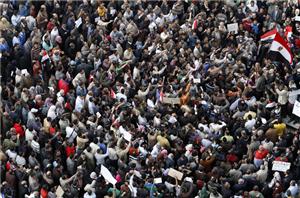Things We Don’t Know
 The unraveling of Mubarak’s regime has proceeded at a tremendously exciting pace over the weekend, spawning news, uncertainty, as well as a layer of ideologically-motivated posturing in the U.S. that is only confusing our still-murky view of the situation.
The unraveling of Mubarak’s regime has proceeded at a tremendously exciting pace over the weekend, spawning news, uncertainty, as well as a layer of ideologically-motivated posturing in the U.S. that is only confusing our still-murky view of the situation.
We still don’t have a full picture of exactly what’s happening now in Egypt. We don’t know what’s happening inside the military and inside the top levels of the regime. We don’t know exactly what kind of schemes the police have implemented, although there’s evidence of undercover cops looting and trying to provoke chaos. We don’t know how motivated the protesters are to organize for the long term – although we do know their actions until now have defied almost all expert predictions. We don’t know how many people have been killed and arrested. And we hardly know what’s happened beyond Cairo and Alexandria. We don’t know how it will all turn out.
Given that vast uncertainty, it’s all the more important that we don’t let ideologues exaggerate what we do know, or paint false pictures of the players involved. We do know that almost all of the protests have eschewed the language of Islamism, the Muslim Brotherhood, and the weak establishment opposition parties. We do know that most Egyptians don’t consider Mohammed ElBaradei an inspiring or charismatic figure, and that until this weekend most activists (secular as well as Islamists) viewed his year-long debut in Egyptian politics with disappointment or even frustration. We know that the Muslim Brotherhood has been reluctant to challenge Mubarak’s regime – declining to join bolder secular parties in boycotting last fall’s parliamentary elections, and sitting out the first rounds of the “Days of Anger” this January. Finally, we know that Egypt’s suffocated civil society boasts only a few institutions with national organizational reach: the military, the state security organs, the ruling National Democratic Party, the Muslim Brotherhood, and possibly the Coptic church. Even if they play little or no role in the protests, they’ll be positioned to capitalize most quickly on a post-Mubarak order.
When an authoritarian state collapses, it’s wise to watch players with existing capacity. It’s even wiser to recall that all bets are off. Once-omnipotent secret police can vanish in a day (it happened in Iraq in 2003). New populist parties can quickly emerge. Dormant or smothered institutions like labor unions can quickly reemerge with vigor, and new political parties can spring up to tap public sentiment. Forces like the popular committees organizing to protect Egyptian neighborhoods from looters and the police could easily morph into a potent political force.
So ignore anyone who tries to paint the situation today in Egypt as a simple struggle between a moderate authoritarian regime led by Mubarak and a fanatical Muslim Brotherhood poised to lead Egypt into war with Israel. That regime, as it existed until last week, will be forever changed by the Days of Rage if it survives in some form or another under President Suleiman. Multiple unknowns surround a Muslim Brotherhood that has acted anything but radical in the last three decades, but that’s largely beside the point; the Brothers simply don’t have the numbers or the dynamism to take over this popular revolt. They’ll be a key stakeholder in any new order, but there’s no evidence to suggest they’ll play a dominant role. The military will still be there next month. So will the labor unions, and so will the privileged class that backed Mubarak’s regime and which in Egypt’s next iteration will still channel much of its economic and political power. Egypt’s history of secular nationalism will surely shape events, as will a surging popular will that until last week was almost entirely a mystery.

